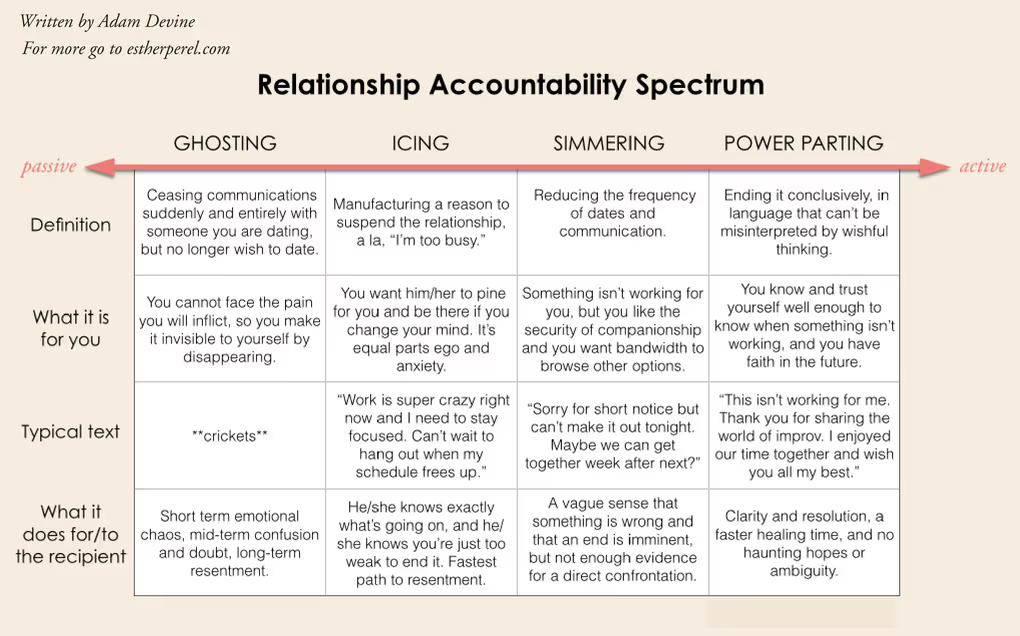Relationship Accountability and the Rise of Ghosting
“I’ve been dating a woman for three weeks, but after we had sex for the first time, she’s stopped texting me back. WTF?” – Edward, 36
Rejection has always been a part of the relationship landscape. But are the new trends of ghosting, icing and simmering increasing our acceptance of ambiguous ends?
Last month, I spoke about modern love at a conference with 2,500 millennials. There, I was introduced to these new norms of intimate relationships and the corresponding vocabulary (we made you a chart, written by my friend Adam Devine).

These tactics of maintaining unclear relationships and prolonging break-ups all produce what I call stable ambiguity; too afraid to be alone, but unwilling to fully engage in intimacy building — a holding pattern that affirms the undefined nature of the relationship, which has a mix of comforting consistency AND the freedom of blurred lines.
We want to have our cake and eat it too. We want to have someone available to cozy-up with when it’s snowing, but if something better comes along, we want the freedom to explore.
In this relationship culture, expectations and trust are in constant question. The state of stable ambiguity inevitably creates an atmosphere where at least one person feels lingering uncertainty, and neither person feels truly appreciated or nurtured. We do this at the expense of our emotional health, and the emotional health of others.
It’s time to bring back relationship accountability.
In situations like Edward’s, the ghostee hopes the ghosted will just “get the hint,” as opposed to having to communicate that he/she is no longer interested. However, inaction has causality. At first, Edward runs the gamut of reasons he hasn’t heard back: She must have a really busy work week. She lost her phone. She doesn’t want to seem too eager. At first, relaxed and patient, Edward tries to be understanding, but his attempts at insight soon morph into uncertainty and self-doubt. Am I bad in bed? Did I say something to offend her? Am I unlovable? In the absence of information, he will fill the gaps, and what he imagines is most likely worse than reality.
Ghosting, icing, and simmering are manifestations of the decline of empathy in our society — the promoting of one’s selfishness, without regard for the consequences of others. There is a person on the other end of our text messages (or lack thereof), and the ability to communicate virtually doesn’t give us the right to treat others poorly.
I encourage you to end relationships respectfully and conclusively, however brief they may be. Act with kindness and integrity. This allows both people to enter into his/her next relationship with more experience and a clear head, rather than filled with disappointment and insecurity.
Ideas to incorporate into a final conversation:
- Thank you for what I’ve experienced with you.
- This is what I take with me, from you.
- This is what I want you to take with you, from me.
- This is what I wish for you, henceforward.
Of course, duos dancing in the stable ambiguity zone don’t always end in a breakup. Sometimes this state is the training wheels period needed for one or both parties to realize he/she wants something more. This is normal for a brief, beginning phase, but not as the defining mode of a relationship.




.svg)





